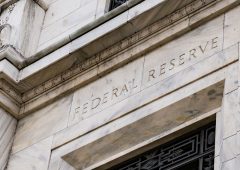Trump Escalates Trade War, Markets on Edge
13.03.2025 21:00 1 min. read Alexander Stefanov
Donald Trump has threatened new tariffs on the EU in response to its planned countermeasures against his steel and aluminum duties.
During a meeting with Ireland’s Prime Minister, he criticized the bloc’s policies and warned of further action.
Canada also hit back, announcing $29.8 billion in tariffs, while its central bank cut interest rates, anticipating economic fallout. The U.S. is now considering restrictions on copper, while the EU’s response could hit $28 billion worth of American exports. Markets fear a deeper trade conflict.
Trump’s tariff policies have alarmed business leaders and lawmakers. Tech executives met with him to raise concerns, but he remained focused on boosting domestic investment. Treasury Secretary Scott Bessent’s remark that the economy needs a “detox” worsened recession fears, sending Wall Street into decline.
ECB President Christine Lagarde warned that U.S. trade policies are fueling instability, citing tariffs as a threat to EU exports. Rising defense spending in Europe could push inflation higher, while the ECB, already grappling with uncertainty, recently cut rates to 2.5%. She stressed the need for transparency in guiding businesses and consumers through volatile conditions.
-
1
China Quietly Advances Yuan as Dollar Alternatives Gain Ground
20.05.2025 17:00 2 min. read -
2
Economic Instability and Political Shift Fueling Bitcoin’s Rise – Galaxy Digital CEO
23.05.2025 12:00 2 min. read -
3
Trump Renews Attack on Fed Chair, Calls for Immediate Rate Cuts
18.05.2025 8:00 1 min. read -
4
Japan’s Inflation Hits 3.5% as Food Prices Soar and Tariff Risks Loom
23.05.2025 21:00 1 min. read -
5
US Dollar Dominance Under Threat Amid Yuan’s Global Ambitions
22.05.2025 14:00 2 min. read
Tariffs Threaten to Stall U.S. Growth in 2025, Recovery Not Expected Until 2026
The U.S. economy may be closer to a downturn than many realize, according to Jay Bryson, chief economist at Wells Fargo.
Dollar Faces Deep Decline as Fed Cuts Pressure Currency, Warns Morgan Stanley
Morgan Stanley has issued a cautionary outlook on the U.S. dollar, predicting a major decline over the coming year as Federal Reserve rate cuts take hold.
Trillions in Debt Payments Could Break U.S. Economy, Ray Dalio Predicts
Legendary investor Ray Dalio has issued a stark warning about the trajectory of U.S. government finances, suggesting the country is drifting toward a series of severe economic shocks unless its debt spiral is urgently addressed.
Wall Street Veteran Warns Tariffs Could Disrupt AI-Driven Market Rally
Steve Eisman, the famed investor known for forecasting the 2008 housing collapse, is sounding the alarm—not on overvalued tech stocks or interest rates, but on the escalating risk of global trade disputes.
-
1
China Quietly Advances Yuan as Dollar Alternatives Gain Ground
20.05.2025 17:00 2 min. read -
2
Economic Instability and Political Shift Fueling Bitcoin’s Rise – Galaxy Digital CEO
23.05.2025 12:00 2 min. read -
3
Trump Renews Attack on Fed Chair, Calls for Immediate Rate Cuts
18.05.2025 8:00 1 min. read -
4
Japan’s Inflation Hits 3.5% as Food Prices Soar and Tariff Risks Loom
23.05.2025 21:00 1 min. read -
5
US Dollar Dominance Under Threat Amid Yuan’s Global Ambitions
22.05.2025 14:00 2 min. read


